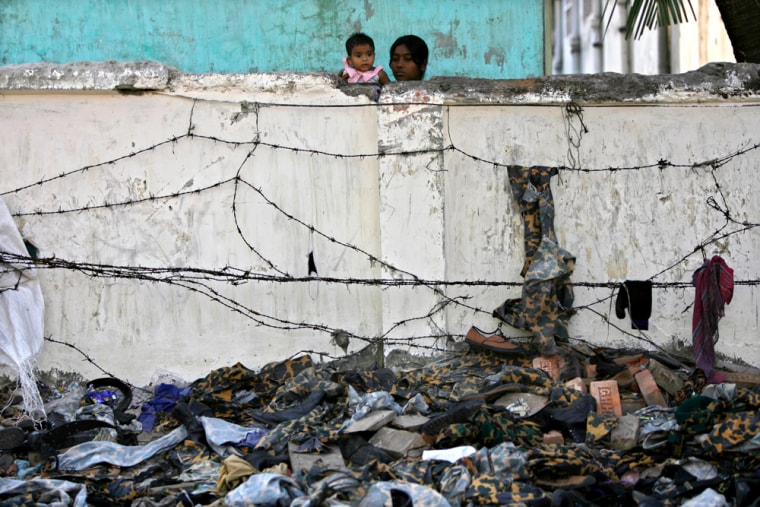The military said 72 officers were still missing Saturday after a two-day mutiny by Bangladesh's border guards, as the death toll rose to 76 with the discovery of 10 more bodies in mass graves at the force's headquarters.
Prime Minister Sheikh Hasina met with political allies at her home Saturday to discuss the uprising, with the group issuing a call for national unity.
Hasina, who took office in January, persuaded the guards to surrender Thursday with promises of an amnesty coupled with threats of military force.
But she said Friday there would be no amnesty for the killers, and her government gave border guards across the country 24 hours on Saturday to return to their posts or report to a local police station.
'Barbaric incident'
Army spokesman Brig. Gen. Mahmud Hossain said at least 33 officers survived the carnage but 72 were still unaccounted for.
"This barbaric incident has caused much anger among the soldiers, which can only be quelled with a fair investigation and trial of the killers," Hossain told reporters.
The mutineers had hurriedly dumped the bodies of dozens of senior officers into shallow graves and sewers at the headquarters compound in the capital, Dhaka. Among the dead was Maj. Gen. Shakil Ahmed, the commander of the Bangladesh Rifles border force. Dozens more officers were missing, and workers scoured the compound and nearby areas, including a pond, in an intense search for more victims.
"We think there are more bodies," said firefighter Sheikh Mohammad Shahjalal, adding that 10 bodies were dug up Saturday in two mass graves. They found at least one woman's body, which they believed was the commander's wife, he said.
The military postponed funerals for 33 officials until all bodies were found.
"To bury all the deceased with state honors, funeral prayers and burials scheduled for today have been postponed," the military said in a statement, adding that a new date would be announced later.
Dangerous ground
The bloodshed has raised new questions about stability in the poor South Asian nation and underlined the fragile relationship between Bangladesh's civilian leaders and the military, which has stepped in previously to quell what it considered dangerous political instability.
The country only returned to democracy after elections in late December 2008, nearly two years after an army-backed interim administration took over amid street protests demanding electoral reforms.
Hasina has a bitter history with the military. Her father was Sheikh Mujibur Rahman, the country's independence leader and its first head of state, who was killed in a 1975 military coup along with his wife and three sons.
"It's a setback for Sheikh Hasina's new government. It's now a test for her how she handles the military," said Ataur Rahman, who teaches political science at Dhaka University.
"This tragic event will force her to divert her attention from consolidating democracy and boosting the economy to tackling the challenges of national security," he said.
The army chief, Gen. Moeen U. Ahmed, met Hasina late Friday and pledged his support.
"The military will stand by the government," Ahmed told reporters.
'Where is my father?'
Following the border guards' surrender Thursday, search teams moved into the sprawling Bangladesh Rifles compound that houses the guards and many of their families and found the gruesome evidence of the killings.
One corner of the compound, nestled under the shade of coconut palms, held two mass graves where slain officers had been put into shallow holes and covered with dirt. Firefighters used crowbars to pry off manhole covers and recover more corpses from sewers.
Dozens of families — particularly those related to senior border guard officers — still did not know what had happened to their relatives.
"Let me talk to my father. Where is my father?" cried 10-year-old Mohammad Rakib, standing outside the devastated headquarters of the border agency on Friday. Rakib was with his mother looking for his father, Capt. Mohammad Shamim.
Bitter over conditions
The insurrection erupted from the guards' longtime frustrations that their pay hasn't kept pace with soldiers in the army — anger aggravated by the rise in food prices that has accompanied the global economic crisis. The guards earn about $100 a month. They also demanded better living conditions and allowances for their families.
Their resentment was heightened by the practice of appointing army officers to head the border guards. The border guards also do not participate in U.N. peacekeeping missions, which bring additional pay.
The army plays a pivotal role in Bangladesh, and only recently allowed the country of 150 million return to civilian rule.
There have been 19 failed coup attempts since the country gained independence from Pakistan in 1971, and two presidents have been killed in military takeovers.
More on Bangladesh
